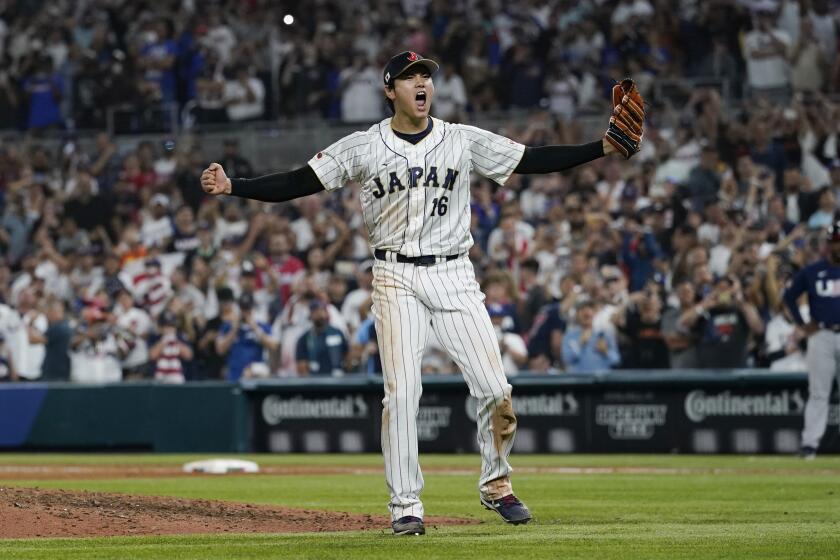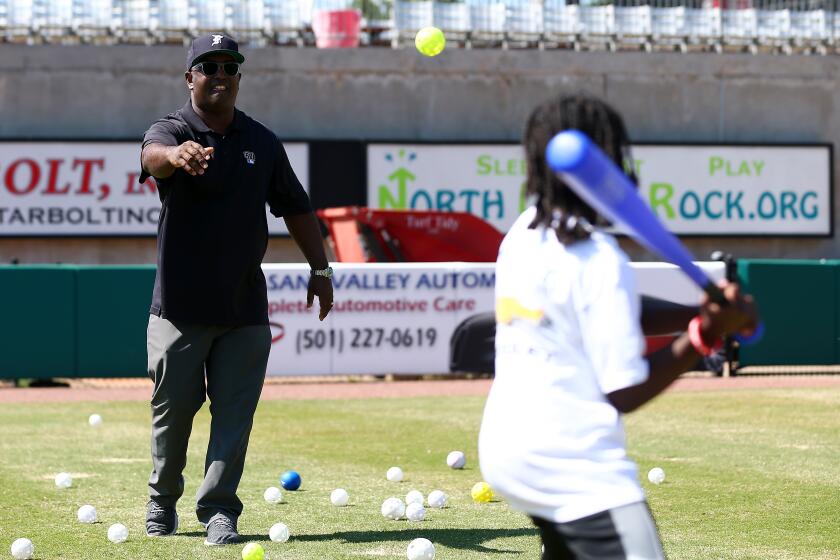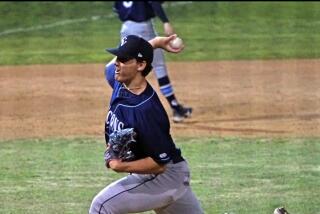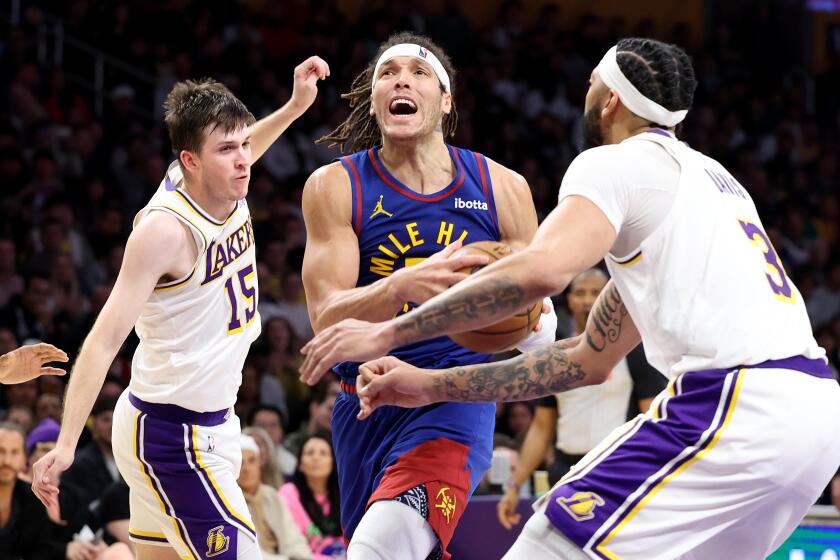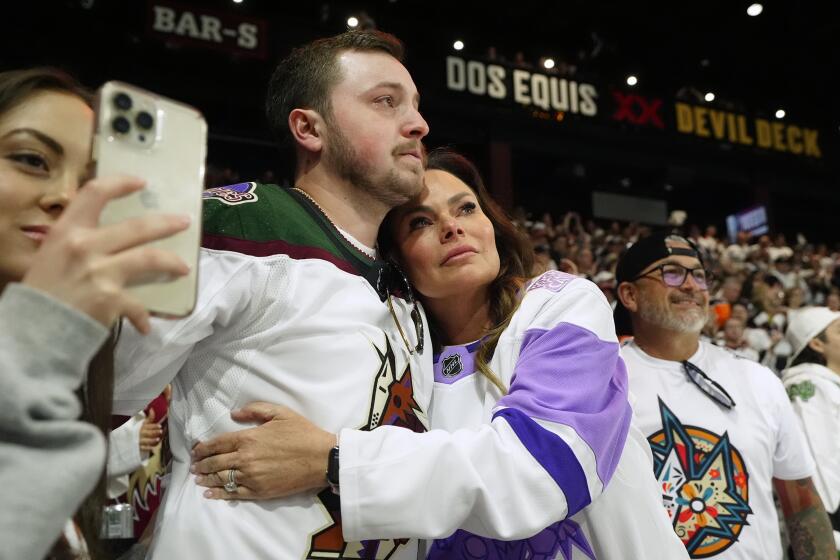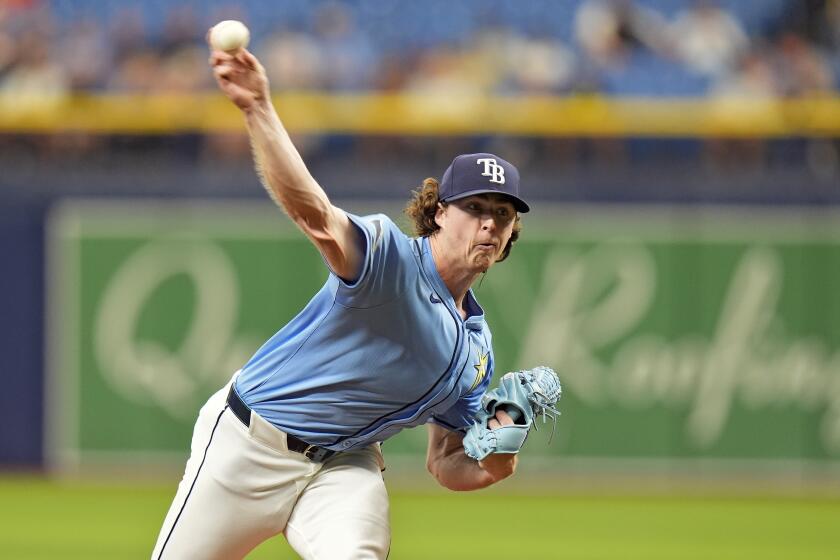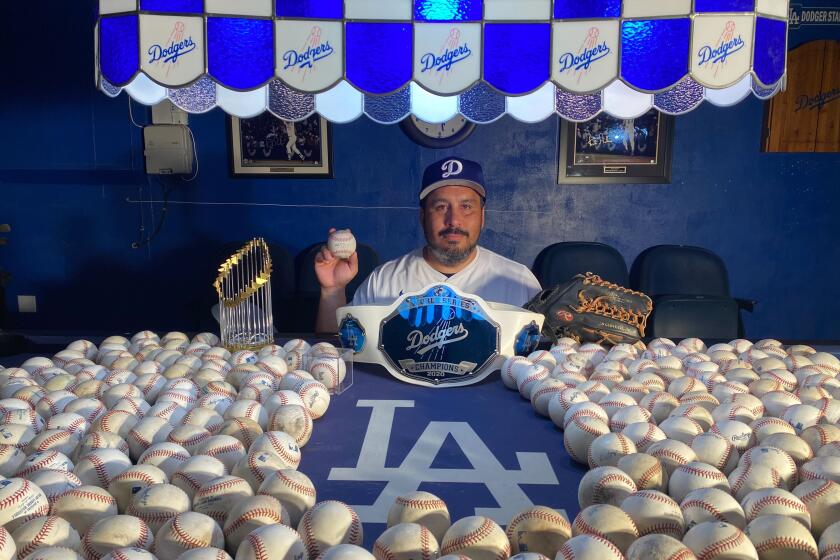The pressure of being a rookie MLB umpire? This Compton native dealt with much more
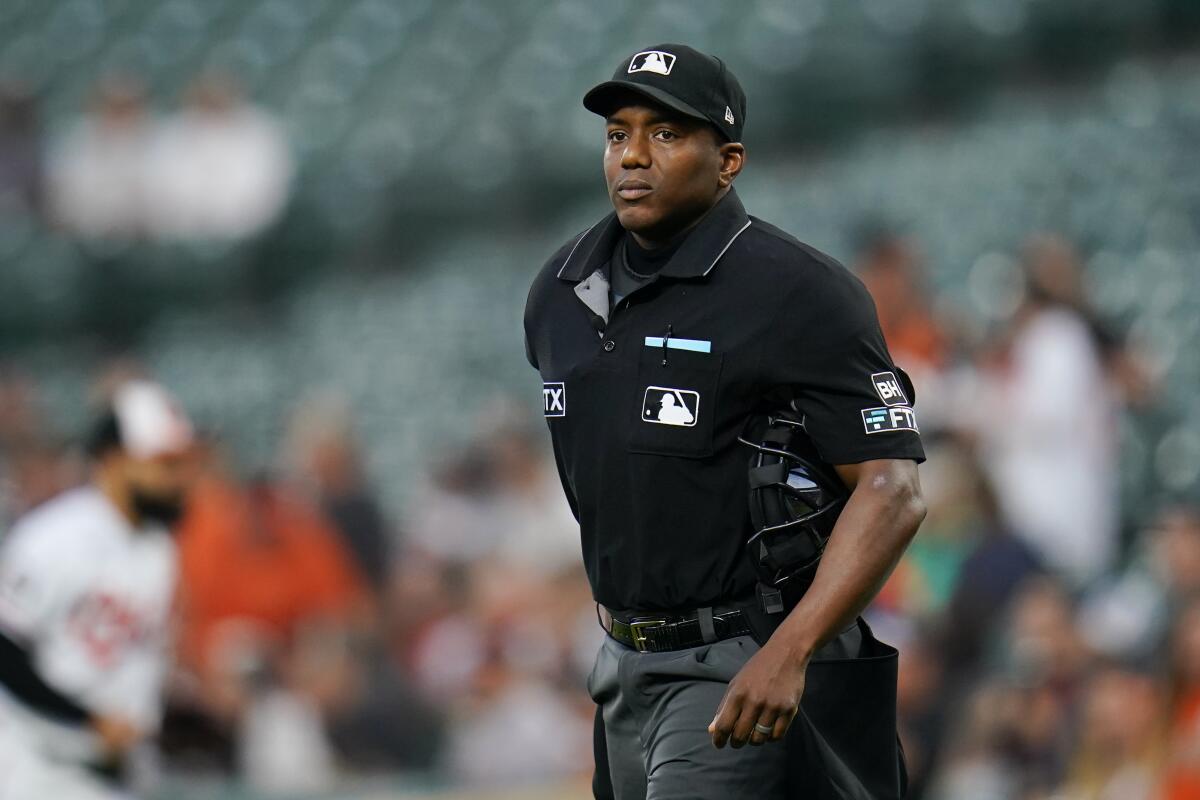
Malachi Moore’s first season as a full-time major league umpire will be stressful enough, what with the bigger stadiums, higher stakes, hostile crowds, enhanced sticky stuff checks, travel demands, and the “Umpire Scorecards” website tracking every one of the 32-year-old’s missed calls.
Throw in the new pitch clock, which will require plate umps to keep a closer eye on the pitcher and batter pre-delivery, be mindful of the buzzer on their wrists, master a new set of hand signals, communicate with field timing coordinators in the press box through an earpiece and microphone — and, oh, you have to call balls and strikes — and the job seems downright daunting.
Not to Moore, the former Compton Dominguez High and Compton College infielder who has faced and conquered far greater challenges and absorbed more trauma than any irate manager, player or fan could ever inflict on a baseball field.
Shohei Ohtani, the tournament MVP, got the save and struck out Mike Trout for the last out as Japan beat the United States 3-2 in the WBC title game.
When Moore was 15, he made the decision with his mother, Neva, to remove his older brother, Nehemiah, from life support after Nehemiah was gunned down in a drive-by shooting in Compton. Nehemiah died the next day.
“I’ll never forget that feeling,” Moore said before working a recent Cactus League game. “It was just a weird, eerie feeling. Like, you don’t even know what to think. You don’t know what to feel. You can’t eat. You can’t sleep. It’s probably the most difficult experience I’ve ever had. That day literally changed my life forever.
“So when we talk about umpiring, and the pitch clock, and the pressure, about being in Yankee Stadium with a full-count on Aaron Judge in the ninth inning ... I’m numb to all that, because after going through what I went through, nothing fazes me. If I can get through that, everything else is a piece of cake.”
Moore, who grew up playing and working at the MLB Youth Academy in Compton, is the first product from any of MLB’s 11 youth academies in the U.S. to reach the major leagues as an umpire.
He always dreamed of the big leagues, but when it was clear he wouldn’t get there as a player, he thought he’d make it as a groundskeeper.
Moore worked at the academy during junior college, waking up at 5 a.m. each day to drag the infields, mow the grass and repair sprinkler heads before school and returning after classes and practice to tend to the fields and shut down the facility.
“It was a full 12-hour day,” Moore said. “I got paid $10 an hour, but I didn’t care. It’s almost like, wow, I’m getting paid, this isn’t work for me.”
Moore’s career arc took a dramatic turn in November 2010 when he and several college teammates served as “guinea pigs” during a one-day umpiring camp at the academy, taking at-bats, making plays and running the bases so aspiring umps could make calls.
Moore caught the eye of then-MLB umpire Kerwin Danley, who was working the camp and asked Moore if he had ever tried umpiring.
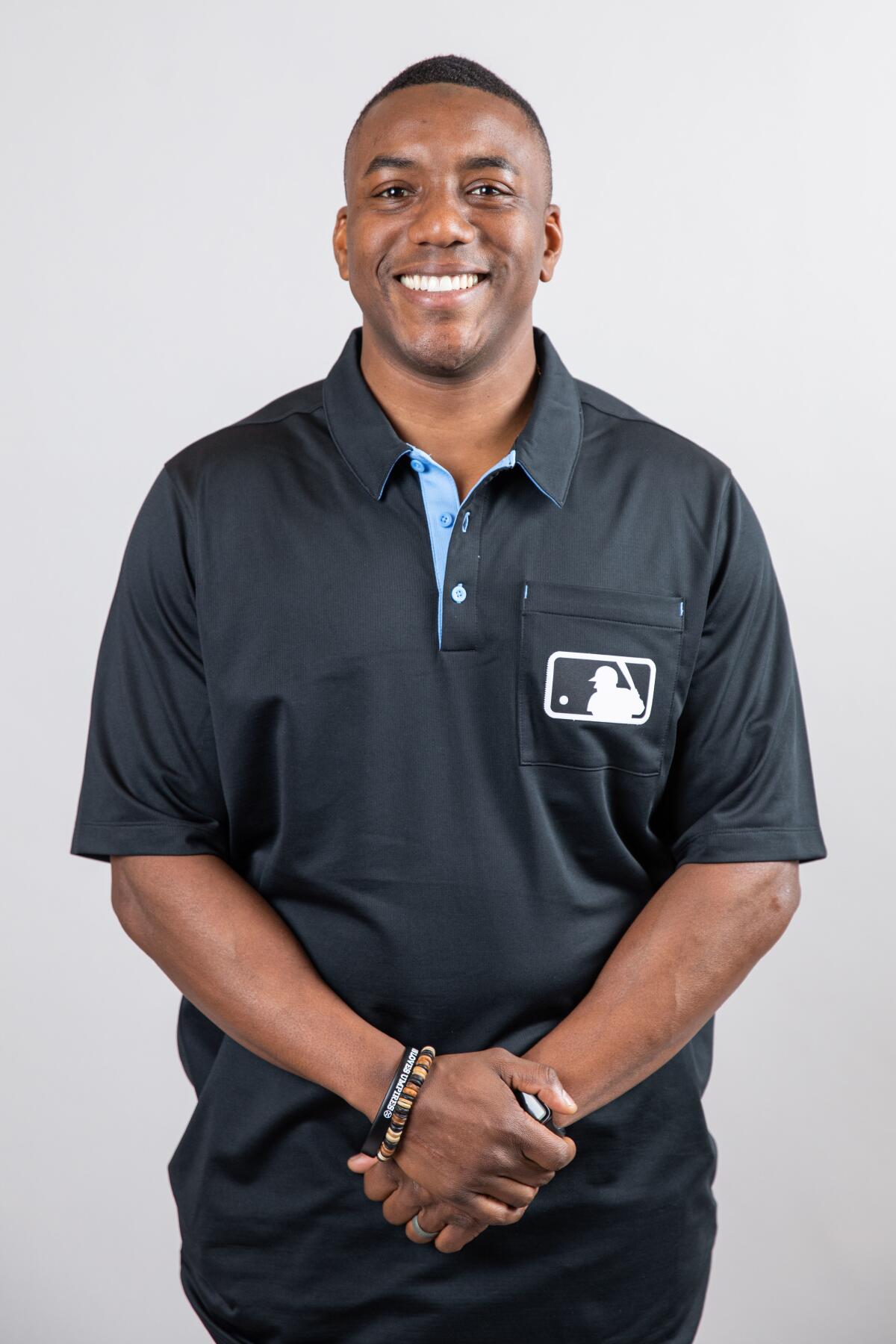
“I told him, ‘Nope, I never thought of it, didn’t care for it,’ ” Moore said. “And he’s, like, ‘C’mon, let’s go to the cages, put some gear on and try it. I politely declined. Long story short, we went to the cages and he had me try out a strike-three mechanic.
“I was there with [former MLB umpire] Chuck Meriwether, God rest his soul, and [MLB umpire supervisor] Cris Jones. They saw me and said, ‘Hey man, you’re having fun with it. You’re kind of picking things up. Take it a little more seriously. You never know what can happen.’ ”
Moore was invited to a subsequent week-long umpire camp, at which he was offered — and accepted — a scholarship to the Harry Wendelstedt Umpire School in Daytona Beach, Fla.
Before leaving for Florida, Moore was asked to umpire an exhibition for a Japanese team at the youth academy. An aha moment ensued.
“It was a seven-inning game, it lasted an hour and a half, and they gave me $80 cash in an envelope,” Moore said. “I thought I was stealing somebody’s money, and I politely declined it. They said, ‘No, that’s yours, you earned it.’ I was like, ‘Oh wow, you can make money doing this?’ Then it kind of transformed me when I went to umpire school.”
The five-week stint in Daytona Beach did not yield a job offer for Moore, who was 20 at the time, but instructors told him he had potential and that there was no need to rush him into professional baseball.
Moore came home and began umpiring high school games in the South Bay in 2011. That summer, he worked the collegiate wood-bat Northwoods League in the Midwest, making $1,500 a month. He returned to the Harry Wendelstedt school that fall, and this time he graduated.
So began an 11-year umpiring journey that started in the Arizona rookie league and included stops in the short-season Class-A Northwest League, the low-A Midwest and South Atlantic Leagues, the high-A California League, the double-A Texas League and the triple-A Pacific Coast League.
The day he and his wife, Sophany, had their second son, Isaac, in 2020, Moore was informed he’d be working big league games as a call-up umpire, filling in for regulars on vacation.
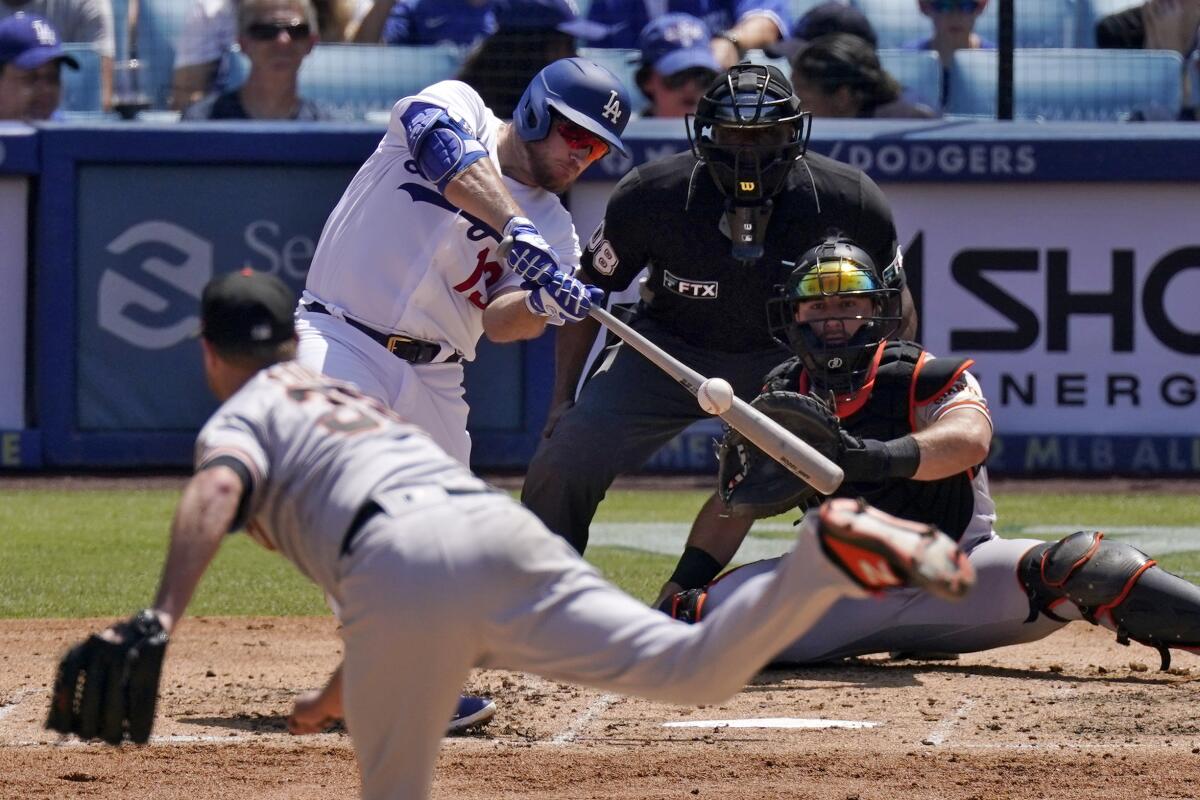
After working 156 major league games over the last three seasons, Moore was one of 10 umpires promoted to full-time roles in January, a job that comes with a $150,000 starting salary. He is the second-youngest of MLB’s 76 full-time umps.
“You almost pinch yourself because you’re thinking, ‘Wow, this is like a dream,’ ” said Darrell Miller, the Compton youth academy director. “Malachi is a great human being, a hard worker, and he has a great story.
“He’s overcome so many hardships and difficult situations. He’s just been a blessing to everyone around him, and we’re really fortunate to have such a great young man come out of our academy.”
Moore, who in 2021 purchased his first home, in Buckeye, Ariz., is the 10th Black umpire in MLB history. He wears No. 44 in honor of Danley, baseball’s first Black crew chief who retired last year. He now serves as an instructor at the Harry Wendelstedt Umpire School and returns to the Compton Youth Academy to conduct umpiring clinics every winter.
“I wouldn’t be here if it wasn’t for the academy,” Moore said. “Everything started there — my passion, my love for baseball, the discipline. You’re held to a higher standard the moment you walk in there.”
Former Angels GM and self-described ‘Boys Club kid’ Tony Reagins is committed to ‘real programs with real young people that have real impact.’
His only regret is that his brother isn’t here to witness his success. Nehemiah was 19 when he was murdered on June 8, 2006, in Compton.
“It was gang violence,” Moore said. “He was in the wrong place at the wrong time. Somebody basically got out of a car and started shooting at the crowd, and my brother was hit. He was shot in the head.”
Malachi was preparing to play a game at the youth academy when he received news that his brother had been shot. He left the facility with his uncle and coach, Mark Huff, to go to the hospital. He returned the next day — the day Nehemiah died — to play a game.
“We were all sitting there crying, trying to comfort him,” Miller recalled, “and he went out and played because he said my brother would want me to do this.”
Seventeen years later, Nehemiah’s death still stings — and drives — Moore. Malachi named his first son, born in 2013, Nehemiah. He had Nehemiah’s name tattooed on his left shoulder. It was Nehemiah who got Malachi involved in baseball as a youngster.
“I know he would be proud of me,” Moore said. “I know he’d try to be at every game he could, be supportive in any and every way.”
More to Read
Get our high school sports newsletter
Prep Rally is devoted to the SoCal high school sports experience, bringing you scores, stories and a behind-the-scenes look at what makes prep sports so popular.
You may occasionally receive promotional content from the Los Angeles Times.

